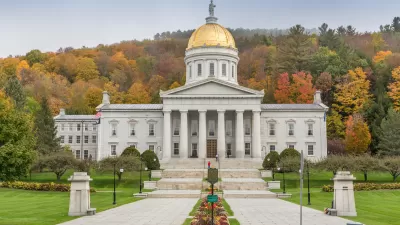Both houses in the Vermont Legislature have approved legislation to preempt local land use regulations by rescinding single-family zoning and easing parking requirements throughout the state.

The Vermont House of Representatives approved S.100, a land use bill “that would legalize duplexes anywhere single-family homes are allowed and four-plexes if the area is served by water and sewer,” reports Lola Duffort.
The Vermont House’s approval of the bill makes the possibility of statewide zoning reform in Vermont much more likely. According to Duffort, “save for new, time-limited exemptions to Act 250, Vermont’s landmark land-use law, the bill mostly mirrors a Senate-passed version, which largely dealt with municipal zoning reform.”
“The bill would also ease local parking space requirements, which developers say often require housing projects to sacrifice units to make room for over-abundant parking,” reports Duffort. “Residents appealing a zoning permit of an affordable housing project also won’t be allowed to do so on the grounds that it goes against the ‘character of the area.’”
In another reflection of contemporary process reforms, the legislation would also remove some zoning barriers to building and operating homeless shelters—similar to a recent executive order signed by New York Mayor Eric Adams.
A separate article by Calvin Cutler for WCAX considers whether statewide upzoning legislation such as S.100 can lower housing prices in a housing affordability crisis.
If the legislation gets across the finish line, Vermont would follow in the footsteps of Oregon and California in wielding state preemption to override local control on issues of land use. Colorado failed to approve similar statewide legislation to allow more dense forms of housing earlier in May. Washington State could also join the ranks of state preempted zoning action if bills under consideration in that state legislature are approved.
FULL STORY: House passes ‘HOME’ bill, which would end single-family zoning and tweak Act 250

Alabama: Trump Terminates Settlements for Black Communities Harmed By Raw Sewage
Trump deemed the landmark civil rights agreement “illegal DEI and environmental justice policy.”

Planetizen Federal Action Tracker
A weekly monitor of how Trump’s orders and actions are impacting planners and planning in America.

The 120 Year Old Tiny Home Villages That Sheltered San Francisco’s Earthquake Refugees
More than a century ago, San Francisco mobilized to house thousands of residents displaced by the 1906 earthquake. Could their strategy offer a model for the present?

LA’s Tree Emergency Goes Beyond Vandalism
After a vandal destroyed dozens of downtown LA trees, Mayor Karen Bass vowed to replace them. Days later, she slashed the city’s tree budget.

Sacramento Leads Nation With Bus-Mounted Bike Lane Enforcement Cameras
The city is the first to use its bus-mounted traffic enforcement system to cite drivers who park or drive in bike lanes.

Seattle Voters Approve Social Housing Referendum
Voters approved a corporate tax to fund the city’s housing authority despite an opposition campaign funded by Amazon and Microsoft.
Urban Design for Planners 1: Software Tools
This six-course series explores essential urban design concepts using open source software and equips planners with the tools they need to participate fully in the urban design process.
Planning for Universal Design
Learn the tools for implementing Universal Design in planning regulations.
Ada County Highway District
Clanton & Associates, Inc.
Jessamine County Fiscal Court
Institute for Housing and Urban Development Studies (IHS)
City of Grandview
Harvard GSD Executive Education
Toledo-Lucas County Plan Commissions
Salt Lake City
NYU Wagner Graduate School of Public Service





























